
END OF AN ERA IN LOCAL MEDICAL PRACTICE
FATHER AND SON PROVIDE HEALTHCARE FOR MORE THAN SIX DECADES
End of an era in local medical practice
by NEIL GREENLEES
| RIGHT: Dr
Brian Ireland, Dr Pamela Vaughan
and Dr Clive Patterson. US-09519A0. |
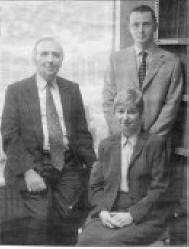 |
MORE than 60 years of family medical practice in Lisburn came to an end last Summer with the retirement of well known general practitioner Dr. Brian Ireland.
The era which began when his father Dr. Hugh Ireland was appointed GP for the Knocknadona Dispensary District in 1937 ended when he left his consulting room at Lisburn Health Centre for the final time on August 2nd.
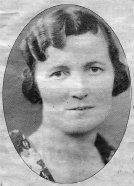 However, the practice he left behind was very different to the
one which his father took over from Dr. Frances Bell three
years before the outbreak of World War 11.
However, the practice he left behind was very different to the
one which his father took over from Dr. Frances Bell three
years before the outbreak of World War 11.
| BELOW: Dr Brian Ireland, Dr Pamela Vaughan and Dr Clive Patterson with health visitors and receptionist of the practice. US09-520A0 |
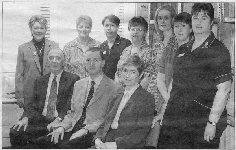 |
In those days consultations took place in the surgery at what was then the Dispensary House at Brookhill just outside Lisburn on the way to Ballinderry and Glenavy.
This was also a number of years before the introduction of the National Health Service and doctors' bills had to be met in the same way as those supplied by any other professional person.
For many families this financial burden added significantly to the stress of a time of sickness but Dr. Ireland Senior is remembered as a man who tried very much to minimise the burden on his patients.
Recalled
One woman whose grandparents attended the practice recalled what they had told her of those days.
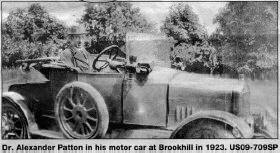 "Dr. Ireland was very good to his patients and didn't chase
them for money," she said.
"Dr. Ireland was very good to his patients and didn't chase
them for money," she said.
"My grandmother told me he would make up medicine and just say something like 'you can pay me when you can Mrs. Totten. Don't worry about this now'."
Dr. Ireland Senior remained the sitting tenant at Brookhill until 1963 when the then Northern Ireland government decided to sell dispensary houses.
He purchased the dwelling and consultatations were still being carried out at Brookhill when his son joined the practice.
"Patients used to come in down the lane and go to the surgery round the side of the house," recalled Dr. Ireland Junior.
However, the trend at the time was for surgeries to move into Lisburn from the rural areas around the town and in 1972 the consulting room moved from Brookhill to Railway Street.
The Health Centre opened seven years later and Dr. Ireland's practice relocated to the new state of the art building at Linenhall Street.
When cholera swept through Lisburn
DOCTOR Brian Ireland still lives in what was the old dispensary house at Brookhill.
He may have retired but his interest in the history of the practice remains strong and he has a collection of arte facts which give a fascinating glimpse of the past.
These show the Knocknadona Dispensary began during the 1850s and the first doctor appointed was Dr. John Johnston Kelso.
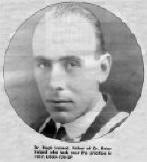 |
| Doctor Hugh Ireland |
In those days there was no fixed dispensary house (surgery) and accommodation in the area was rented at around £7 10s per year.
Dr. Kelso was in attendance at these rooms a couple of days per week.
Almost a quarter of a century passed before the purchase of the land on which the dispensary house was constructed.
During this time Dr. Kelso was succeeded by a Dr. Alexander who was the first practitioner to take up residence in the new dwelling.
He was followed by Dr. Alexander Patton who in turn was succeeded by Dr. Frances Bell, a lady doctor who was also highly regarded by her patients.
Dr. Ireland's father took over the practice when Dr. Bell left in 1937.
A minute book of the Knocknadona Dispensary Committee, which Dr. Alexander left in the house, reveals some interesting occurrences in the practice's past.
For example, at one stage it was necessary to set up branch surgeries at Stoneyford and Trummery which were used for the purpose of inoculating people against smallpox.
However, one of the most serious episodes was an outbreak of cholera which affected the Lisburn area in the early 1850's.
The recorded minutes of a meeting held at this time show homes had to be fumigated and coffins obtained in which to place the bodies of those who succumbed to the disease and whose families could not afford a casket.
Dr. Kelso submitted an article on the subject of this
epidemic to 'The Lancet' of September 1, 1855.
The first case in the area which Dr. Kelso appeared to believe
was an indication of the way in which the disease was
communicated from one place to another, involved a young man
who was a weaver to trade.
On Monday April 17, 1854 he abruptly left his home at Bridge End Hill in Lisburn while quite well.
He did not return until Thursday when he was 'somewhat jaded and out of sorts' from the effects of his 'ill timed ramble'.
It appeared during his absence he spent at least one night in a lodging house in the Ballvmacarrett area of East Belfast.
Dr. Kelso said in his article cholera 'rather extensively and very fatally' prevailed in this quarter.
The first symptoms evidenced themselves 'very distinctly and somewhat violently' the following Sunday.
The outbreak of this often fatal disease ran for a number of months. During a two week period beginning on July 9 there were 16 cases, 13 of which proved fatal.
At the end of August there were 12 cases, 10 of which 'ended unfavourably'.
In all 236 cases occurred between May and the end of November.
Of these, 92 were male and 144 female with 73 of either sex being aged under 15. A total of 114 people who remained at home during their illness died.
The largest number of cases presented during the last week in June and the second week in September.
The June weather was described as unseasonably wet, damp and cold and the climate in September was hot and sultry.
A cholera hospital was established at the Union Workhouse in Lisburn and this stayed open from May till October.
